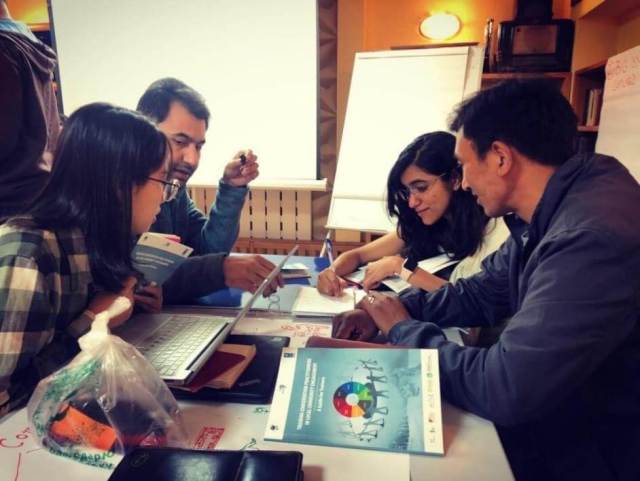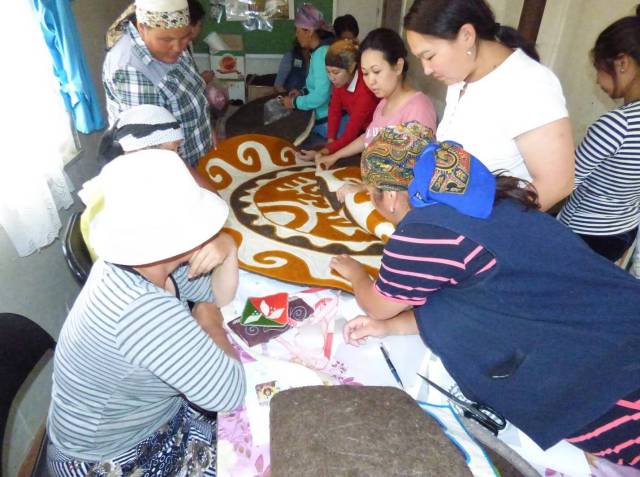The Snow Leopard Trust and its partners have engaged with local communities in key snow leopard habitats of Central Asia for more than three decades, working on conservation solutions that benefit both people and wildlife.
The engagement with local communities is critical for the success of conservation efforts. When conservation interventions are carried out without the necessary sensitivity and respect, it can damage relationships and trust, lead to injustice to local people and cause setbacks for ecological outcomes. Therefore, community-based engagement is vital for conservation efforts to be effective. Until recently, few guides or resources have existed to provide an inclusive framework for community-based conservation. Community engagement and establishment of community-based interventions are mostly done in the field by trial and error, with field teams often not having access to formal training.
In his book ‘The PARTNERS Principles for Community-Based Conservation’, Snow Leopard Trust Executive Director, Charu Mishra, has skillfully distilled our experiences into a set of guidelines for wildlife conservationists wishing to engage with communities. The PARTNERS Principles identify eight core tenets for building respectful, responsive and transparent community partnerships that can support stable and effective conservation interventions. The PARTNERS Principles have been adapted into a training course by an international team of conservation and social scientists and have been tested with more than 100 conservationists from across snow leopard range.

Now the goal is to scale up best practices in community-based conservation across snow leopard range countries. In October 2019, 18 conservationists from 5 snow leopard range countries including Pakistan, India, China, Kyrgyzstan, Mongolia and representatives from the Snow Leopard Trust were trained as ‘trainers’ in the best practices for community-based conservation. A number of these participants have over 15 years of experience in snow leopard conservation. The training took place over four days. Participants shared stories and experiences of best practices, challenges and practical solutions to address these challenges. The training also focused on providing facilitation and teaching skills so that the training course could be delivered in an effective and fun way.
“There isn’t and perhaps shouldn’t be one correct way to do community-based conservation; every situation is unique. However, we identify key principles that help respect communities and work towards finding long term co-existence of people and snow leopards,” shared Dr. Charu Mishra.
Over the next two years and beyond the goal is for the 18 ‘trainers’ to carry out Partner Principle training of their own with over a hundred frontline field staff throughout the snow leopard range. “We hope that this training of trainers will be the catalyst to promoting best practices of community-based conservation,” shares Ajay Bijoor, the lead facilitator for the training. “We envision that this will also motivate new teams and organizations to work with local communities that co-exist with snow leopards, but also with other species such as bears, wolves and other carnivores.”

The Partners Principles training was followed by a workshop on how to improve the efficiency and effectiveness of community based conservation programs such as the Snow Leopard Enterprises handicraft program. Snow Leopard Enterprises is the Trust’s long standing conservation program that creates economic opportunities for herder families in snow leopard habitat in return for a commitment to protect the cats. Participating herder communities use felted wool from their livestock to create beautiful, unique handicrafts, such as ornaments, slippers, pet toys and rugs. They sell them to the Snow Leopard Trust or its partners for mutually agreed-upon prices. In return, herders commit to protecting snow leopards in their area, and are awarded annual bonus payments when we find no evidence that cats have been harmed during the year. Workshop participants spent two days sharing experiences working on Snow Leopard Enterprises in their respective countries and worked together to developing best practice recommendations so that the program effectively achieves its conservation outcomes. For example, the India program team shared how Snow Leopard Enterprises has helped empower women conservation champions: Women participants in northern India are actively adopting pro-conservation practices by asking local people not to poach birds or other wildlife around their villages.
“These trainings are a unique opportunity to share and learn from the experiences of 5 snow leopard range countries.” Shared Kuban Jumabaev, Director the Snow Leopard Foundation Kyrgyzstan, “We are always looking for ways to improve and strengthen our conservation efforts

Acknowledgements:
We express our gratitude to the Melkus Family Foundation and the United Nations Environmental Programme for sponsoring the Partners Principals training.

